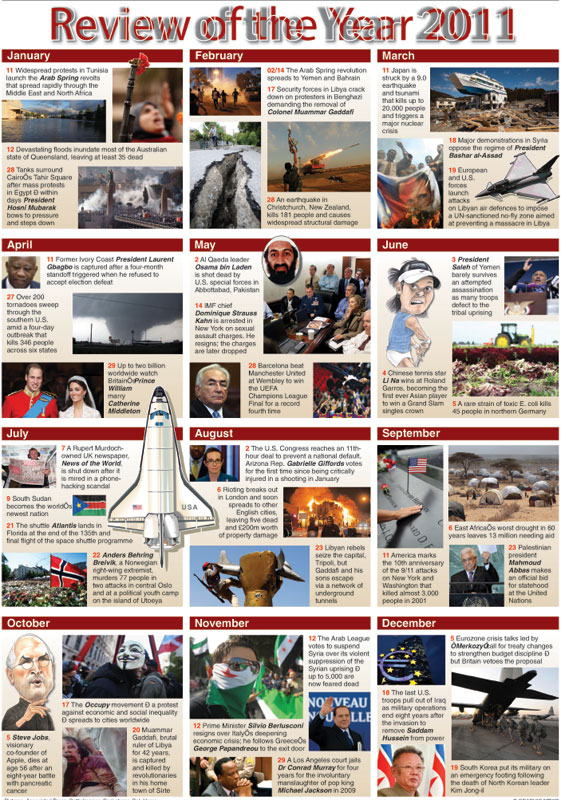The strategic geo politics of economics and the economics of politics drastically changed the balance of power and the power games in the world this year with the globalised capitalist market economy crumbling like the sand castle that it was and the Durban summit ending in a debacle that has drawn the world closer to the doomsday scenario.
The ancient Mayan tablet, astrologers and superstitious elements are predicting the end times or a new era some time around December 2012. China also has declared 2012 as the Year of the Dragon and significantly the dragon is identified in the holy Bible's book of Revelation as the monster who will appear in the end-times. But apocalyptic warnings apart, natural catastrophes linked to climate change, related factors and profit-driven wars of big powers appear to be carrying the world towards self-destruction.
The Arab Spring
The Arab Spring or whatever descriptions and definitions given to it by various parties began in Tunisia in December 2010 and the fallout or the consequences from it were among the main headlines of the year. After the Tunisian dictator Zine El Abidine Ben Ali was toppled in a people-power revolution, that spirit of freedom from corrupt dictatorial rule spread to Egypt and several other Middle Eastern countries.
Ironically, it was the self-immolation of the Tunisian youth Mohammed Bouazizi that set the Middle East on fire for freedom. He was an educated youth without a job and was selling fruit or vegetable in the city centre when he was slapped by a female constable. In protest he set himself on fire and that human torch of freedom is still blazing across the Middle East and other parts of the world.
The historic protest by the people of Egypt produced scenes similar to the era of the pharaohs and eventually brought down the dictator, Hosni Mubarak, who had ruled the country with an iron fist for 30 years. The demonstration in Cairo's Tahrir Square and elsewhere went on weeks after week, months after months, with hundreds including brave women and children, being killed or injured in their crusade for freedom, justice and equality.
The turning point was when the all-powerful military decided to support the people and it signalled the writing on the pyramids for Mubarak and his family who were alleged to have amassed some $ 50 billion in wealth.
An ailing Mubarak and his sons are facing trial that could lead to their execution but the people's protests are also continuing because they believe the military is not letting go of power for real democracy to be restored. Parliamentary elections are being held as promised with two Islamic parties appearing to be in the lead.
Gaddafi grounded
But the people are insisting that full power be handed over to a democratic civilian government and their protests have led to more killings this month. Presidential elections are scheduled to be held in Egypt in July next year. But where it will all end is still a big question with neighbouring Israel and the United States watching the events with concern.
The other highlight of the Arab Spring was the ouster or the slaughter of Libyan leader Muammar Gaddafi who had ruled the country for some 40 years. Unlike in Egypt where it was largely if not entirely an internal revolution against the inequitable distribution of wealth and resources, the upheaval in Libya was directly supported by the mighty fire power of the North Atlantic Treaty Organisation (NATO).
Social and tribal factors sparked the revolt in oil-rich Libya, but NATO gave air support with United Nations approval because of the important geopolitical role that Gaddafi was playing, especially in Africa, where most of the countries supported him till the end. It is alleged that the UN resolution which was meant to maintain a no-fly zone was deliberately misinterpreted by NATO countries to attack any military target.
Ultimately, Gaddafi who had been widely popular not only in his own country but in the Third World also was slaughtered in such a manner that new Libyan National Transitional Council may face war crimes charges before the international criminal court.
Bahrain protected
Revolutions by the people were also seen in Yemen, Bahrain and Syria. But the double standards or the double dealing of the United States and regional powers like Saudi Arabia produced different results in Yemen and Bahrain. While the US has its Fifth Fleet and other vital interests in Bahrain, the pro-American Saudi regime sent troops to crush the popular revolt there.
The Saudis also have important vested interests in Yemen and therefore worked out a compromise deal where President Abdullah Saleh agreed to step down and handover the reins to the vice president as a temporary measure. But millions of people there were still languishing in varying degrees of destitution, deprivation and degradation, are not happy with the compromise and observers feel there could be another major uprising soon.
Pressure mounts on Syria
In Syria also widespread public protests have been going on in several areas for the past few months with at least 7,000 people reported to be killed and thousands of others injured, detained, abducted or missing.
Russia and China had for months blocked any strong UN resolution or action against the Bashar al-Assad regime's massacre of its own people, but the Arab League has taken tough action together with regional power Turkey and earlier this week Syria agreed to a compromise whereby international observers would be allowed to come and see what is going on.
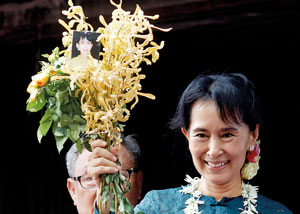 |
| Hope: Myanmar’s democracy icon Aung San Suu Kyi says she is optimistic about her country’s democratic future |
 |
| Horror: Gaddafi who ruled Libya for more than four decades captured and killed by Libyan rebels who were backed by NATO forces |
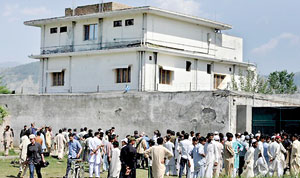 |
| Manhunt ends: Al-Qaeda leader Osama bin Laden’s Abottabad hideout where he was killed by US Speical Forces in a raid that was kept a top secret even from Pakistan. The raid drew an angry protest from Pakistan. |
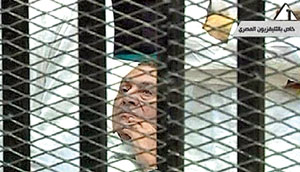 |
| Fall of Pharoah: Dictator Hosni Mubarak was brought in a stretcher to court to hear charges of corruption and complicity in the killing of protesters |
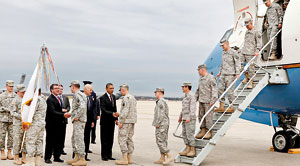 |
| Welcome home: U.S. President Barack Obama watches the return of the United States Forces-Iraq Colors during a ceremony at Joint Base Andrews marking and the end of the war in Iraq on December 20. Reuters |
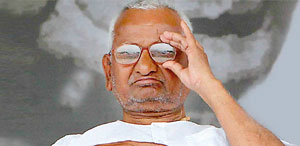 |
| People power: Millions of Indians rallied behind Gandhian social justice activist Anna Hazare, givng him the moral support to wage a crusade against corruption in government |
With the protests and the killing continuing, Russia also appears to be changing its position and may support strong action against the Syrian regime which is dominated by the minority Alawites, members of a sub sect of Shiite Islam.
This is the main reason why neighbouring Iran, widely accused of developing nuclear weapons, is strongly supporting the Assad regime as is the Lebanese Shiite militia group Hizbollah which is known to be getting vital supplies from Iran through Syria.
While Russia's latest resolution was rejected by the UN Security Council with Germany saying it was too mild, some of the worst violence continued in Syria this week as an advanced group arrived from the Arab League to prepare the way for international observers.
With all these power games within games, agendas within agendas and conflicts within conflicts, the United States in its election year 2012 seems to be heading for a showdown with Iran on nuclear and other issues. Throughout this year there have been reports that Israel is preparing for a massive strike on Iran's nuclear facilities.
But it has not happened because such an attack could trigger off a third and possibly final world war.
Iraq: A sham pullout
While President Barack Obama and still-sharply divided republican candidates, including the Tea Party neoconservatives, are breathing fire and brimstone on Iran as if it is something like a Sodom or Gomorrah, the US has pulled out its troops from Iraq, ending an eight-year-war based on lies or weapons of mass deceptions.
The US has tried to negotiate a deal with the Nouri al-Maliki government to maintain a base or bases in Iraq. Mr. Maliki outwardly refused but a backstage compromise was apparently reached for the US to maintain a staff of some 17,000 in its embassy - perhaps a number that will get a place in the Guinness Book of Record.
Among those in this world record number will be diplomats, CIA or other spies, like the notorious Raymond Davis, who was involved in one of the incidents which seriously damaged US-Pakistan relations.
President Obama, apparently playing politics with a vengeance in a desperate bid to win a second term in office put on a brave face when he greeted the retuning troops and said ending a war was more difficult than starting a war. Indeed so, as the US found out in Vietnam, Iraq and Afghanistan where it is determined to pull its troops out by 2014 though the strategically located country is in one hell of a bloody mess.
Days after the US troops withdrew from Iraq, the country was shattered by one of the worst ever incidents when at least 65 people were killed and more than a hundred injured in sectarian violence attributed to Sunni-Shiite groups.
This carnage sent the al-Maliki government and the country itself plunging to breaking point with a warrant being issued for the arrest of Sunni Vice President Tariq al-Hashimi on charges plotting to kill some VIPs. But al-Hashimi has been given refuge in the semi-autonomous Kurdistan region, creating further divisions within divisions in a blood-stained Iraq.
Osama bin Laden killed
One of the notable US successes in the Afghan battle was the highly controversial killing of al-Qaeda leader Osama bin Laden in Abottabad near the Pakistani capital of Islamabad on May 2. Without the knowledge of Pakistani authorities, US Special Forces had monitored the area for months with hi-tech equipment and covert operations. Though the devil in the details is still like a ghost story, the US announced that it had buried bin Laden in the sea and al-Qaeda acknowledged the death on May 16, vowing it would retaliate.
The bin Laden killing was one of the episodes which have led to a dramatic, drastic and dangerous breakdown in the relationship between the once close allies, the US and Pakistan. The recent killing of Pakistani troops by NATO forces in a border area last month led to a political outburst from Islamabad but caught in a geopolitical web, with India on one side, Afghanistan on the other and uncertain factors all around, the Pakistani warnings are seen more as political proclamations for public consumption than any practical retaliatory measures.
Nuclear crisis after tsunami
With the calamitous 2004 tsunami still fresh in the minds of Sri Lanka where more than 35,000 people were killed and hundreds of thousands injured or displaced, the earthquake and tsunami in Japan hit not only the headlines but brought back horrifying memories. The deadly difference in the 9.0 earthquake and tsunami of March was the nuclear factor at the Fukushima power plant with fears that the consequences might be worse than what happened in Chernobyl. Ironically, it was in Hiroshima and Nagasaki that the first nuclear bombs exploded with the death toll known to be in the hundreds of thousands.
Atomic power was meant mainly for constructive and development purposes. Today a selfish and insensitive, if not senseless, world has turned this great discovery into a weapon of mass self-destruction.
Behind every political action or misadventure is a hidden economic agenda as seen in the wars in Afghanistan and Iraq where the US-led forces went in apparently to gain control of the vast oil, natural gas and other mineral resources in those countries and in the neighbouring region.
Wall Street rattled
Despite this neocolonialism where poor countries are stripped of their resources even without their knowledge, the crony capitalist economic system of the west is collapsing.
The once mighty United States was shocked into reality when its biggest banks and companies plunged into bankruptcy and the besieged government was forced to bail them out with tax payers' money which company executives had wasted with vulgar extravagance.
The economic crisis sent President Obama's popularity rating plunging to an all time low but he seems to be recovering not so much because of any economic recovery but because of rows within rows in a gaping GOP, the Republican Party.
In recent months, the world has watched with astonishment the unprecedented protests where hundreds of people gathered in New York and other cities in the US to demonstrate against the economic monstrosity where Wall Street's multi millionaires and billionaires comprising just one percent of the population were known to be controlling more than 60 percent of the country's wealth and resources.
The United States itself for the first time in its history came perilously close to bankruptcy or the debt ceiling law of 14 trillion dollars. Though the bankruptcy was averted through a last minute bipartisan deal, the Wall Street protests are continuing and have spread even to other capitals of the capitalist world. In Britain, for instance, protests were staged outside St. Paul's Cathedral where the radical Archbishop of Canterbury, Rt. Rev Rowan Williams, said he believed that if Jesus Christ was physically present today he would join the demonstrations for a more equitable distribution of wealth, justice and equality.
Europe crumbling?
From the US, the financial and fiscal crises hit the European Union where Ireland, Greece, Portugal, Spain and Italy fell or nearly fell into bankruptcy and their governments were toppled or changed. Germany's Chancellor Angela Merkel and France's President Nicolas Sarkozy in a do-or-die summit to save the euro and the Eurozone called an urgent summit where they virtually forced other countries to accept the package of austerity measures, financial and fiscal reforms. Britain opted out of it while some of the Eurozone countries expressed reservations and asked for time.
With the Western economy in turmoil by the year's end, Asia led by economic giants China and India appear to be racing ahead to become the political and economic hub of the world. But the Western economic calamity was affecting growth in China and India where the governments were finding it difficult to sustain the burgeoning middle class while millions of people were still known to be living on or below the poverty line.
Anna’s anti-corruption war
Among the significant events in Asia was the anti-corruption protest led by Gandhian activist Anna Hazare in India. His fast-unto-death forced the Manmohan Singh Government to agree to enact and implement a tough anti-corruption bill in the aftermath of huge frauds involving ministers and VIPs. Another noteworthy event was the whispering hope of democracy in Myanmar where the Nobel laureate and opposition leader Aung San Suu Kyi was released after several years of house arrest.
These and other moves by Myanmar's new leader U Thein Sein prompted the US to send Secretary of State Hillary Clinton for talks with government leader and more significantly two long meetings with Aung San Suu Kyi at the very place where she had been held under house arrest. Aung San Suu Kyi is to contest a by-election soon and has expressed optimism regarding the democratization of her country.
In West Asia, the Palestinians' hope for an independent state was revived with the Palestinian Authority President Mahmoud Abbas vowing to obtain recognition from the UN General Assembly. However, under pressure from the US, the move was deferred though UNESCO recognised Palestine as an independent state.
It was amidst hopes of Asia's emergence as the leading continent that North Korea on December 20 officially announced that its revered leader Kim Jong Il, son of the secretive and self-isolated and nuclear-armed state's founder Kim Il Sung, had passed away after being ill for about three years. Kim Jong Il is likely to be succeeded by his 28-year-old son Jong-Un, who is known to have had little experience in politics and statecraft while less is known about him except that he was educated in the West. This has prompted some analysts to speculate that the new leader might do in North Korea what Deng Xiaoping did to Mao's China by turning it into a semi-capitalist, market-oriented economic power house. The Chinese media gave wide publicity to Kim Jong Il's death and expressed the hope that the close ties between the two countries would be continued under North Korea's new leadership.
The relationship with North Korea is vitally important for China because most other big countries in the region are known to be working closely with the US, politically, militarily and economically.
Ultimately and essentially, the most important message from 2011 is that though the cold war ended in 1990 with the dismantling of the Soviet Union, what died with it was the atheistic, Stalinist model of brutal communism. Many architects of crony capitalism believed that socialism was dead but events of this year show that we are moving economically at least towards a world that is more just and fair. But the bigger question is whether we will destroy ourselves before we reach that noble goal.
|







